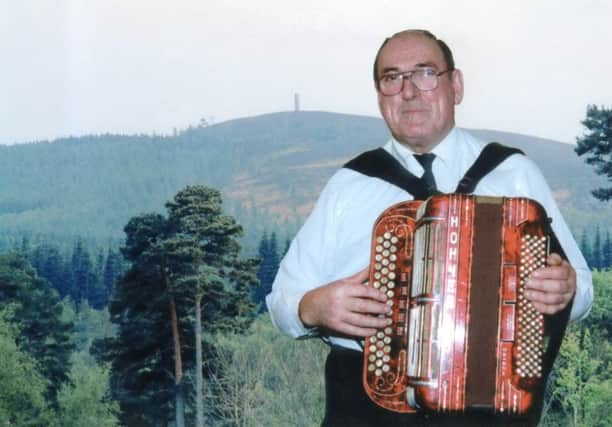Obituary: Bill Black, shepherd, bandleader and businessman


When Bill Black’s father set out to by a wardrobe at a roup and came back with a fiddle he could have had little idea of the influence his curious shopping trip was to have on his seven-year-old son’s life.
The youngster not only mastered the fiddle by himself but he found himself teaching his tutor during his first formal lesson. And when he got the chance to try out a melodeon it took him just half an hour to perfect his first tune.
Advertisement
Hide AdAdvertisement
Hide AdThough there was no musical heritage within the family, that didn’t hinder his interest or talent and, though unduly modest about his ability, he went on to become one country’s most respected bandleaders, button accordionists and fiddler players, winning national championships, broadcasting on the BBC and playing internationally.
Even the loss of a finger in an accident ten years ago was no deterrent : he simply set about re-learning the accordion and continued to perform for appreciative audiences.
Born near Crieff, on Tombain Farm at Muthill, which had then yet to be reached by electricity, his father Bob was a shepherd. Young Bill, one of a family of four daughters and two sons, was educated at Guy School near Ballinluig, then the Royal School of Dunkeld and finally McLaren High in Callander before following in his father’s footsteps as a shepherd.
By that time he was already proficient in the fiddle, having earned his first penny from music playing You Are My Sunshine to a neighbour who popped round to borrow some sugar. He spent any money he had on music – even snaring rabbits to sell to buy a record – and played his first public engagement, in Strathyre Village Hall, with the Glengarry Band when he was in his early teens.
His interest in accordion music stemmed from the age of 15 when a visitor allowed him to try his melodeon. He then gifted the instrument to the boy who promptly taught himself to play proficiently, just as he had done with the fiddle, picking up tunes from the radio and his parents’ 78 records.
Throughout the 1950s Black’s musical talent was increasingly in demand and, after marrying his wife Anne, in 1960, she too would become involved, on piano, along with his daughter Kate, a singer, and sons Robert and Duncan on accordion.
He formed his own band, The Bill Black Scottish Dance Band, in 1971 – the same year that he won the senior Scottish Accordion Championship, beating off another 50 competitors. He then entered the Scottish Trio Championships, with Jack Lindsay on fiddle and Joan Blue on piano, and triumphed three years in a row. He also won the fiddle championship at the Newcastleton Festival around this time.
And in 1975 the band made their first record, Sounds of the Perthshire Glens, with Bill as lead box, Jack Ness second box, Jim Rennie on fiddle, Bruce Wilson on bass and Bill Anderson on drums. When Jack Ness emigrated to Canada, Graeme Mitchell from Huntly took his place for five years until he made way for Black’s son Duncan. The band played the length and breadth of Scotland, from Wick to Bournemouth, all the western islands and every year he attended Up Helly Aa in Lerwick and the Shetland festival.
Advertisement
Hide AdAdvertisement
Hide AdEventually other band members drifted off to go their own way and the family began working together, making their first appearance as the Black Family band towards the end of the 1970s. More than a dozen albums followed, among them Blacks’ Magic, Black’s Family Favourites, 50 Years On, Bill Black’s Button Box and Dancing Through Perthshire.
Despite failing his first and only BBC audition – a subsequent producer over-ruled his predecessor’s decision and he never had to audition again – Black made many radio broadcasts including on Robbie Shepherd’s Take The Floor. He also played regularly in Ireland and toured abroad to Copenhagen to play for the King and Queen of Denmark – the tune Tam Bain’s Lum went down well, apparently – and to the Nigeria capital Lagos.
He and Anne also established the Stanley Ceilidhs in 1979, which they ran for 25 years, and did an enormous amount for various local charities, including Rachel House, raising more than £70,000 over the years.
Meanwhile he still had the day job. He had worked as a shepherd and then head shepherd under his father on the Ancaster Estates in Crieff – providing the perfect album title Shepherd’s Choice – and enjoyed considerable success in sheep dog trialling in the late 1960s and early 1970s. He had also won the Scottish Championship for Hand Sheering Sheep at the 1960 Royal Highland Show. He gave up working on the land in 1974 and became an agricultural sales representative before setting up a partnership in the farming supply business five years later and building up shops in Aberfeldy, Oban and Inverness.
In 1999 he was honoured by the Association of Accordion and Fiddle Clubs for his contribution to Scottish music – he composed dozens of tunes – named Guest Artiste of the Year in 2005 he was inducted into the Traditional Music Hall of Fame in 2009 – just three years after losing his right index finger. After that accident he taught himself to play again, performed two more broadcasts for BBC Radio Scotland and made his final album, Just The Three Of Us.
Whilst immensely proud of his own family – his daughter is both pianist and singer and his sons are both Scottish Accordion champions and professional musicians – he will be particularly remembered for nurturing younger talent who were just starting to make an impression, earning his danceband a reputation as something of a finishing school for aspiring musicians.
He is survived by Anne, their children Kate, Robert and Duncan and three grandchildren.